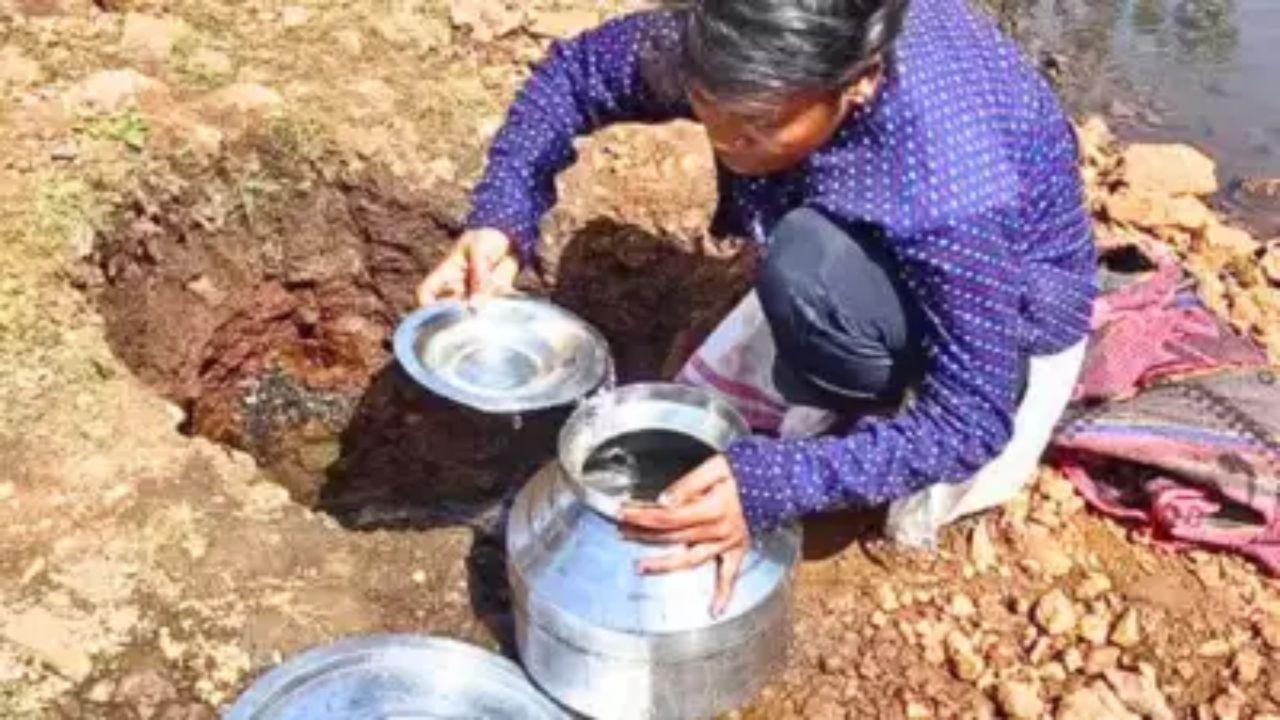Amid the summer heatwave and rising high temperatures in various parts of the country, several villages in the Melghat and Vidharbha region of Maharashtra are experiencing a severe water crisis, forcing residents to collect water from polluted sources. Several areas in Delhi are experiencing extreme water crisis.

A man fetching contaminated water from a pit (Picture Credit: ANI)
Amid the summer heatwave and rising high temperatures in various parts of the country, several villages in the Maharashtra's Amravati district especially Melghat region are experiencing a severe water crisis, forcing residents to collect water from polluted sources, resulting in health hazards.
The residents of Mariampur village in Amravati Village alleged that they are forced to collect drinking water by digging pits on the bank of the polluted pond. The locals have further criticised government for taking no action regarding the severe water crisis in the village. The locals alleged govrnment, citing non-functional government water tanks and absence of adequete water tankers sent in their village.
ADVERTISEMENT
Subhash Sawalkar, a villager, said "Our village has only one pond and that too polluted. We wake up around 4 am and go to the pond and collect water for our children. It takes about 2-3 hours to fill the pits we dig. People queue up to collect this polluted water, which causes health problems for our children. Just today, I had to take my children to the doctor for medicine."
"There is no tanker supply and we don't even receive water from the taps. We come here early in the morning and sometimes we have to stay until 10-11 pm just to collect this dirty water. The water crisis is creating a lot of trouble, and no one is taking action upon it." added Phulkai Belsare, an elderly resident of Mariampur.
"Can nobody see what is happening in Mariampur? From the Municipal Committee to the water department, everyone is just sleeping. We face a severe water crisis. Other villages have government taps and borewells, but we don't even have those. We had one facility for tap water but that was also damaged. I demand that the government repair our taps." She further added, "We wait for hours to collect dirty water from these pits, which is harmful to our health. There is no tanker supply or any other assistance," Jasmine, another villager said expressing her frustration.
Amravati falls within the Vidarbha region of Maharashtra. Due to climate vulnerability, Vidarbha is one of the regions worst hit by water crisis and it has been a long standing issue in the Vidarbha region. Due to lack of adequate water in this region for multiple purpose including farming, it oftrn attributed to high rate of farmer suicides in the region.
Along with Maharashtra, several other parts of the country are suffering from a severe water crisis due to extreme heatwave. Earlier on Thursday, various parts of Delhi suffered water crisis. The residents had to wait for hours in a long queue for water tankers.
The residents of the Geeta Colony in the East Delhi district have raised concerns regarding the inadequate supply of water from the government. As reported by ANI, they complained about government providing only half the needed amount of water.
A resident of Geeta Colony, Vinay, told ANI, "We are facing a severe water crisis. Our locality has a population of around 3,000-4,000 people, but the government sends only half the required number of tankers." He added, "Although a tanker comes daily, but in this scorching heat, the demand for water has significantly increased. Sometimes, they reduce the amount of water in the tanker, due to which we suffer a lot. While in the absence of tankers, the wealthier residents can buy water, but the poorer ones cannot, due to which they have to drink dirty water, which leads to illness."
"We have complained to the MLA of the area multiple times, but we have never received a valid response. No one is listening to us." Vinay further added expressing his frustration.
An elderly resident at Geeta Colony shared, "I usually come after 10-15 days, sometimes even a month, but as always, I don't get water.
Shabru Khatun, a resident of the colony, said that they have faced a lot of problems regarding water in this area. They get only one tanker for the entire area and the tanker water is used for drinking and cooking purposes. "Sometimes, we don't even get the tanker, and we are forced to buy bottled water," Shabru Khatun told ANI.
While Siliguri is also added to the list of cities facing extreme water crisis, the resident of Shilguri are requested by Shilguri Municipal Corporation to not drink the water supplied by the corporation due to its contamination.
Municipal Corporation Mayor of Siliguri, Gautam Dev, said, "After receiving a report that found the BOD level is slightly high, we requested the people of Siliguri not to take the supply water for drinking purposes until further notice. "
On Thursday, people in Siliguri were spotted standing in long queues before private drinking water suppliers to buy water, amid the severe water crisis in Shilguri.
 Subscribe today by clicking the link and stay updated with the latest news!" Click here!
Subscribe today by clicking the link and stay updated with the latest news!" Click here!








